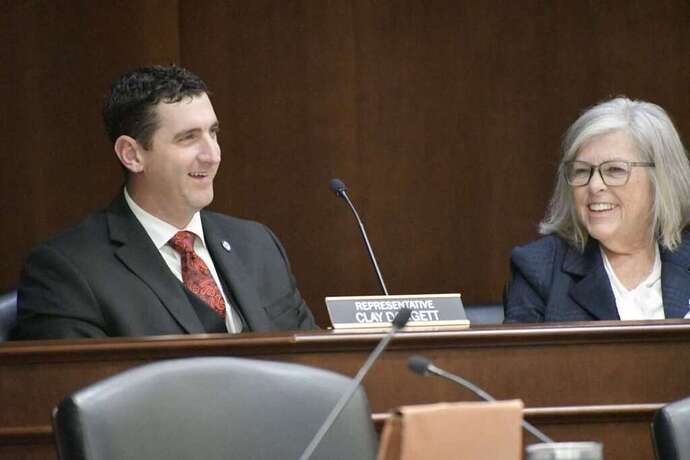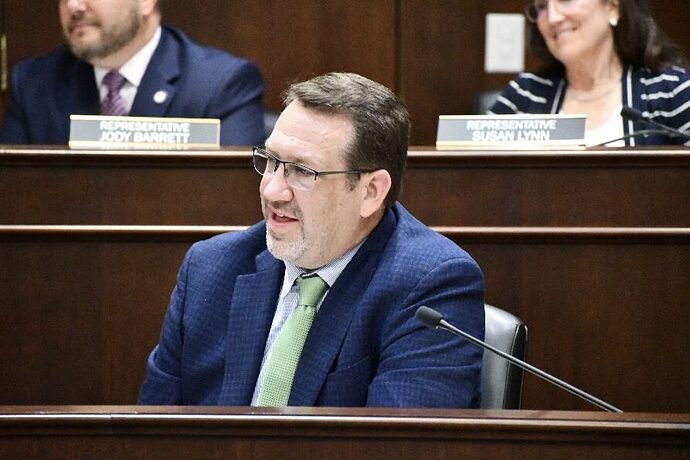House advances Debbie and Marie Domestic Violence Protection Act
The House Criminal Justice Subcommittee this week advanced legislation that would significantly increase protections for victims of aggravated domestic assault in Tennessee.
House Bill 2692, also known as The Debbie and Marie Domestic Violence Protection Act, would require aggravated assault suspects in certain domestic violence cases to wear a global position monitoring system (GPS) if they were released on bond.
“For many years, Tennessee has struggled with being in the top percentile for domestic violence, and more specially, domestic violence deaths,” said bill sponsor State Rep. Clay Doggett, R-Pulaski. “In my time here in the legislature, I’ve tried to find legislation that would help provide additional protections and remedies to victims, especially those of aggravated domestic assault…. This is just another tool that we can use for victims and law enforcement to be able to make sure there is an avenue of safety for (them).”
A GPS service provider must be able to notify a victim’s cell phone if their alleged attacker is within a certain proximity of their location. The company would also be required to notify local law enforcement when a violation of a defendant’s bond conditions occurred.
The legislation is named in honor of Debbie Sisco and Marie Varsos. Both women were killed in 2021 by Varsos’ estranged husband Shaun who was out on bond for strangling his wife and threatening to shoot her a month earlier.
There were 61,637 victims of domestic violence statewide in 2022, according to the most recent data from Tennessee Bureau of Investigation. House Bill 2692 is scheduled to be heard in the Criminal Justice Committee on Feb. 20.
Republicans file Second Amendment Financial Privacy Act
Legislation has been introduced to protect financial transaction data associated with firearm and ammunition purchases from being used to conduct mass surveillance of law-abiding Tennesseans.
House Bill 2762, also known as the Second Amendment Financial Privacy Act, would prohibit financial institutions like banks and credit card companies from requiring the use of a specific merchant category code (MCC) to identify transactions that occur at firearms retailers in the state. The bill would also prevent legal purchases at the retailers from being denied based solely on the code as well as protect financial records of the transactions from disclosure unless required by law.
“Tennesseans should never have to worry about their legal purchases being denied or tracked simply because they involve firearms and ammunition,” said bill sponsor State Rep. Rusty Grills, R-Newbern. “This legislation will increase protections for law-abiding citizens who wish to take advantage of their constitutionally-protected right to bear arms. I remain committed to defending freedom in Tennessee, which includes the Second Amendment.”
Alleged violations of the law would be investigated by the Attorney General’s Office and could result in a civil penalty of up to $10,000 if necessary, according to the bill. If approved, Tennessee would join a handful of other states like Florida, Idaho, Mississippi, Montana and Texas that have already passed similar legislation. The new law would take effect July 1.
Bill would provide additional support for nursing home residents
Republican legislation that provides additional financial support for long-term nursing home residents in Tennessee advanced out of the House Health Subcommittee this week.
House Bill 2321, sponsored by State Rep. Patsy Hazlewood, R-Signal Mountain, would increase the personal needs allowance for residents from $50 to $70 per month. Existing state law allows Medicaid-eligible individuals receiving long-term care in a nursing home to deduct a portion of their income to use on personal needs with the remainder being applied to the cost of their care.
“If (residents) need clothes or anything extra that the nursing home doesn’t provide, then either their families have to provide it or they have to take care of it out of this very small allowance,” Hazlewood told members of the subcommittee Tuesday. “It is still not going to allow anybody a lot of extra spending money, but hopefully it will help just provide some dignity and a little bit [more] control to these folks.”
If approved, the increase would take effect Jan. 1, 2025. House Bill 2321 is scheduled to be heard in the Health Committee on Feb. 21.
House files budget bills
Work continued on Capitol Hill this week as lawmakers advanced multiple pieces of legislation through committees and the House floor. The House Finance, Ways and Means Committee also continues to hold budget hearings to discuss the funding requests each state department has for the upcoming fiscal year.
Republicans in the General Assembly remain committed to making additional investments that support education, public safety, health care and economic development along with quality of life improvements for all Tennesseans.
Budget-related legislation that has been filed includes:
Budget implementation: House Bill 2971 will make the statutory revisions that are necessary for the implementation of the state’s budget for the upcoming 2024-25 fiscal year. Gov. Bill Lee earlier this month unveiled his $52.6 billion budget proposal to members of the General Assembly. The plan also includes an additional $20 million investment in the state’s Rainy-Day Fund, bringing the account to $2.07 billion to be used in the event of an economic downturn. Republicans will continue to maintain fiscal responsibility while passing a zero-debt budget that includes key investments in strategic areas throughout the state.
Appropriations: House Bill 2973 authorizes funding for various legislative initiatives including a proposed $261 million in new funding for K-12 public schools, $144.2 million to establish the Education Freedom Scholarship Act to begin expanding school choice statewide, a $410 million annual franchise tax cut and other significant investments to support public safety and rural health care.
Bonds: House Bill 2972 is the annual bond bill that authorizes the state to issue and sell bonds.
Lawmakers will review the budget proposal and making their own recommendations in the weeks ahead.
Firearm safety education for public school advances
The House Education Instruction Subcommittee this week advanced Republican legislation to expand firearm safety education in Tennessee public schools.
House Bill 2882, sponsored by State Rep. Chris Todd, R-Madison County, would provide students with age and grade appropriate instruction on firearm safety as part of the existing safety training currently offered in public schools. The curriculum would include safe storage information, how to identify a firearm, the safety risks associated with them and to notify an adult if one is found.

“It is important for our young people to be aware of the proper precautions that should be taken if they encounter a firearm,” Todd said. “This legislation would ensure students in Tennessee receive this valuable safety information during their school years as determined by leaders in education. The bill also includes guidelines to make sure the curriculum remains strictly informative and not political in any nature. This is an additional way we can help prevent injuries and increase safety across Tennessee.”
The Department of Education and Department of Safety, in consultation with the Tennessee Fish and Wildlife Commission, would determine the earliest appropriate grade for students to begin receiving education related to firearm safety. The instruction would continue through the 12th grade.
The legislation would prohibit the use live firearms and ammunition as part of the curriculum. Instruction would also be required to remain neutral on political and gun-related issues.
House Bill 2882 is scheduled to be heard in the Education Instruction Committee on Feb. 20.
Bill to improve student safety on college campuses advances
Legislation to ensure college students in Tennessee can protect themselves on campus without facing criminal charges advanced out of the House Criminal Justice Subcommittee this week.
House Bill 1909, introduced by State Rep. Gino Bulso, R-Brentwood, would clarify that it is not a crime for adults to carry certain non-lethal weapons in most buildings, recreation areas and other facilities on public college campuses.
“We have very large colleges and universities across this state,” Bulso said. “They’re like small cities in some cases, and there have been assaults or attempted assaults, particularly against young ladies, on (them). The intent of this is to allow all adults, but particularly young female college students, a way of defending themselves through the use of non-lethal force.”
The bill specifies that non-lethal weapons include pepper spray, a pepper spray gun, pepper gel, mace, an electronic control device, a stun gun or other conducted energy device. House Bill 1909 is scheduled to be heard in the Criminal Justice Committee on Feb. 20.
Public school therapy dog pilot program proposed
A bill to create a therapy dog pilot program in Tennessee public schools advanced in the House this week.
House Bill 1908, also known as the Beyond Ordinary Learning Opportunities Act, would require the Tennessee Department of Education (DOE) to create a one-year pilot program that would place a therapy dog in five public schools statewide.
The therapy dogs would “assist students who may have emotional issues including anxiety, depression or other issues, as well as be a benefit to the entire student population of the schools that receive the dog,” according to bill sponsor State Rep. Gino Bulso, R-Brentwood.
The pilot program would take place during the 2024-25 school year. The DOE would then submit a report to the General Assembly detailing the effectiveness of the program.
Therapy dogs in schools can improve students’ social well-being and reading skills and have other cognitive benefits, according to the Alliance of Therapy Dogs. House Bill 1908 is scheduled to be heard in the Finance, Ways and Means Committee on Feb. 21.
Emma’s Law would improve TennCare funding determinations
The House Insurance Subcommittee this week advanced legislation that would change how TennCare determines medical necessity to ensure recipients receive the best care possible.
House Bill 2445, also known as Emma’s Law, would require TennCare to consider a patient’s overall condition when determining the level of funding for medical items and services that will be provided, regardless of cost.
“We’re just asking that when you look at the determination of medical necessity that you look at things like a patient’s mobility or their ability to move or turn,” said bill sponsor State Rep. Rebecca Alexander, R-Jonesborough. “You look at things like a patient’s cognitive awareness and their ability to communicate. You look at a patient’s need for constant nursing supervision as well as a patient’s need for a ventilator or other life-sustaining equipment.”
The legislation is named in honor of one of Alexander’s constituents, Emma Harrod, who requires constant supervision and care resulting from a neurological disorder that was discovered in 2016. The TennCare funding Emma’s family received for her care was reduced last year after the time she spent on a ventilator was lowered from 12 hours to eight hours each night.
House Bill 2445 is scheduled to be heard in the Insurance Committee on Feb. 20.
Bill would increase sales tax holiday savings for shoes
Legislation has been filed that would make more shoes eligible to be tax free during Tennessee’s annual back-to-school sales tax holiday weekend.
House Bill 1864, sponsored by House Republican Caucus Chairman Jeremy Faison, R-Cosby, would increase the overall cost of shoes that would qualify for the tax exemption from $100 to $150. The price limit for articles of clothing would be $80.
“If you have ever had a child in sports, it’s unbelievable how much shoes cost,” Faison told members of the House Finance, Ways and Means Committee on Wednesday. “We could potentially help some families who would benefit from being able to save that portion of the sales tax and be able to possibly buy soccer shoes or football shoes or basketball shoes.”
Tennessee’s back-to-school sales tax holiday is held the last weekend of July every year. During that time, eligible clothing, school supplies and computers are sold tax-free. Additional information can be found on the Department of Revenue’s website.
House Bill 1864 has been placed behind the budget for consideration at a later date.
Briefly…
Animal abuse: House Bill 2079, introduced by State Rep. Bryan Terry, will allow veterinarians in the Tennessee to report suspected animal cruelty and testify in judicial proceedings regarding that animal’s care without violating veterinarian-client-patient confidentiality. A veterinarian would also have immunity from any breach of confidentiality under this legislation if they are acting in good faith reporting the suspected abuse. House Bill 2079 is scheduled to be heard in the Agriculture and Natural Resources Committee on Feb. 21.
Public school employee safety: House Bill 1812, filed by State Rep. Rebecca Alexander, R-Jonesborough, would allow all public and charter school employees to receive their full salary or average pay and full benefits if they were physically assaulted on the job and unable to work as a result. There were 1,918 cases of assault and 71 cases of aggravated assault against teachers and staff during the 2022-23 school year, according to the 2024 Tennessee Safe Schools Report. House Bill 1812 is scheduled to be heard in the Education Administration Committee on Feb. 21.
Elected officials: House Bill 2080, filed by State Rep. Dave Wright, R-Corryton, would prohibit candidates in Tennessee from seeking more than one elected public office at the same time. The legislation would not apply to petitions for state executive committees, presidential delegates or to qualify for a special election. House Bill 2080 is scheduled to be heard in the Local Government Committee on Feb. 20.
Law enforcement drones: A bill that will allow law enforcement to continue using drones for searches and evidence collection in cases of natural emergencies or criminal investigations passed the House chamber on Thursday. House Bill 1620, filed by State Rep. John Gillespie, R-Memphis, allows law enforcement to continue to use drones for certain security, investigative and disaster mitigation purposes without needing court approval. The legislation now heads to Gov. Bill Lee’s desk to be signed into law.
Gold Star Children’s Day: The House chamber on Monday unanimously approved House Joint Resolution 733, introduced by State Rep. Ed Butler, R-Rickman, which designates Aug. 1 as Gold Star Children’s Day in Tennessee. Gold Star Children are children who have had a parent that was killed while serving in the U.S. military. House Joint Resolution 733 will now go to the Senate for approval.
Family Life Curriculum: A bill to ensure topics related to sexual activity are prohibited from being taught to students in kindergarten through fifth grade as part of a family life curriculum passed the House chamber on Monday. Tennessee’s K-5 family life curriculum standards do not currently include information about sexual activity, and House Bill 996, sponsored by State Rep. Charlie Baum, R-Murfreesboro, will ensure that continues. The companion version of the legislation is still advancing through the Senate.
State offices will be closed on Monday, Feb. 19 in observance of President’s Day.
The Nuclear and Innovative Energy Exhibit was held Tuesday at the State Capitol in Nashville. The event, organized by State Rep. Monty Fritts, R-Kingston, showcased Tennessee’s nuclear and innovative energy
advantage. Attendees heard from several industry institutions including the Y-12 National Security Complex, Oak Ridge National Laboratory and the University of Tennessee Nuclear Engineering Department.
###
This is a companion discussion topic for the original entry at https://tnhousegop.org/weekly-wrap-2-16-24/


